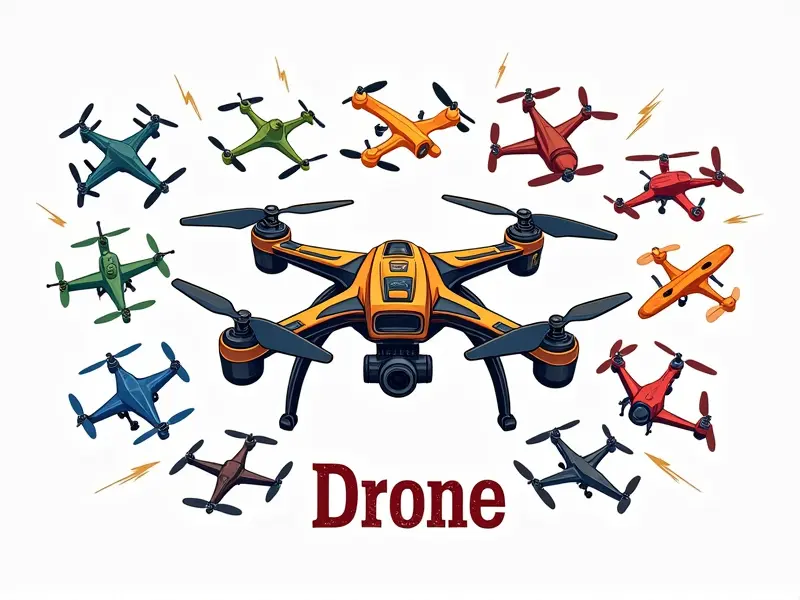What is the battery life?

How Long Do RC Drone Batteries Last?
The battery life of an RC drone significantly impacts its flight duration and overall performance. Typically, most consumer-grade drones operate on lithium-polymer (LiPo) batteries which provide a balance between power density and weight. The average flight time for these drones ranges from 15 to 30 minutes, depending on the model's specifications and battery capacity.
High-performance racing drones often have shorter flight times due to their high-power motors and lightweight construction, usually lasting around 7-12 minutes per charge. Conversely, larger, more robust drones designed for aerial photography or videography may offer extended flight durations of up to 45 minutes.
Maximizing FPV Racing Drone Flight Time
To extend the battery life and flight time of your FPV racing drone, consider several strategies:
- Lightweight Components: Use lighter motors, propellers, and electronic speed controllers (ESCs) to reduce overall weight.
- Battery Management: Opt for high-capacity batteries with a higher cell count but ensure they are balanced properly. Regularly check battery health using a charger's built-in balance function.
- Efficient Propellers: Choose propellers designed specifically for racing to maximize thrust and minimize drag, thereby conserving energy.
Quadcopter Battery Capacity Guide
The battery capacity of a quadcopter is crucial in determining its flight duration. Common capacities range from 1000mAh to 6500mAh. Here’s how different capacities affect performance:
- Lightweight Quadcopters (1000-2000 mAh): Ideal for indoor use or small-scale operations where maneuverability is prioritized over endurance.
- Moderate Capacity Quadcopters (3000-4500 mAh): Suitable for outdoor photography and videography, offering a good balance between flight time and payload capacity.
- High-Capacity Quadcopters (6000+ mAh): Best suited for long-duration surveillance or mapping missions requiring extended battery life.
Extend Your RC Plane's Flight Time
Increasing the flight time of your RC plane involves optimizing various components:
- Battery Upgrades: Utilize high-capacity LiPo batteries to extend endurance, but ensure they are compatible with your aircraft’s power system.
- Aerodynamic Improvements: Enhance the plane's aerodynamics by reducing drag through streamlined designs and efficient propellers.
- Weight Reduction: Remove unnecessary components or use lighter materials to decrease overall weight without compromising stability.
Common Causes of Short Drone Battery Life
Several factors can lead to premature battery drain in RC drones:
- Overheating: Excessive heat can degrade battery performance and shorten its lifespan. Ensure proper ventilation and cooling mechanisms.
- Battery Aging: Over time, batteries naturally lose capacity due to repeated charging cycles and chemical degradation.
- Inefficient Propellers: Using propellers that are not optimized for your drone can result in inefficient energy consumption.
Optimizing Drone Battery Performance
To get the most out of your drone’s battery, follow these tips:
- Battery Maintenance: Regularly check and maintain batteries to ensure optimal performance. Store them in a cool place away from direct sunlight.
- Charge Cycles Management: Limit the number of charge cycles by using the battery until it reaches 20-30% remaining capacity before recharging.
- Battery Monitoring: Use advanced monitoring tools to track voltage levels and temperatures during flight, helping you avoid over-discharge or overheating issues.
Boosting RC Helicopter Battery Efficiency
To enhance the battery life of your RC helicopter, consider these strategies:
- Battery Quality: Invest in high-quality batteries with balanced cells to provide consistent power output throughout flights.
- Efficient Motors and Propellers: Use motors and propellers designed for optimal performance and energy efficiency.
- Airflow Optimization: Ensure proper airflow around the aircraft to prevent overheating during prolonged flight periods.
Airplane RC Battery Life Expectancy
The battery life expectancy of an RC airplane depends on its design and usage patterns. Generally, airplanes with larger batteries can achieve longer flight times but may require more frequent maintenance checks due to the higher stress placed on components during extended flights.
To maximize longevity:
- Regular Inspections: Conduct thorough inspections before each flight to ensure all systems are functioning correctly.
- Battery Cycle Management: Adhere to recommended charge cycles and avoid deep discharges which can damage the battery’s internal structure.
Factors Affecting FPV Drone Battery Life
The flight time of an FPV drone is influenced by multiple factors, including:
- Battery Capacity: Higher capacity batteries offer extended flight durations but may add weight to the aircraft.
- Motor Efficiency: Motors that consume less power while providing sufficient thrust contribute to better overall battery life.
- Air Resistance: Minimizing air resistance through aerodynamic designs can help conserve energy and extend flight time.
Understanding Battery Tech in RC Models
Battery technology plays a critical role in the performance of RC models. Common battery types include LiPo, NiMH (Nickel-Metal Hydride), and LiFePO4 (Lithium Iron Phosphate). Each has its own advantages:
- LiPo Batteries: Offer high energy density, fast charging times, and are lightweight but require careful handling to avoid safety issues.
- NiMH Batteries: Provide reliable performance with a lower risk of overheating or fire compared to LiPo batteries. They are heavier and have slightly less capacity.
- Lithium Iron Phosphate (LiFePO4): Known for their durability, longevity, and safety features, these batteries are ideal for applications requiring high discharge rates without compromising on lifespan.
Optimal Battery Choices for FPV Racing
Selecting the right battery is crucial for competitive FPV racing. Consider:
- Battery Specifications: Choose batteries with higher cell counts (e.g., 4S, 6S) to increase voltage and provide more power.
- Discharge Rates: Opt for batteries with high discharge rates (C-ratings) that match the demands of your racing setup.
- Battery Protection: Use quality protection circuits to safeguard against over-discharge and short-circuiting, ensuring safe operation during intense races.
By understanding these factors and implementing the right strategies, you can significantly enhance the performance and longevity of your RC drone’s battery, leading to more enjoyable flights and extended use.
Conclusion
Maintaining optimal battery health is crucial for maximizing the flight time and overall enjoyment of your RC models. By following these guidelines and staying informed about advancements in battery technology, you can ensure that your drones perform at their best for years to come.

